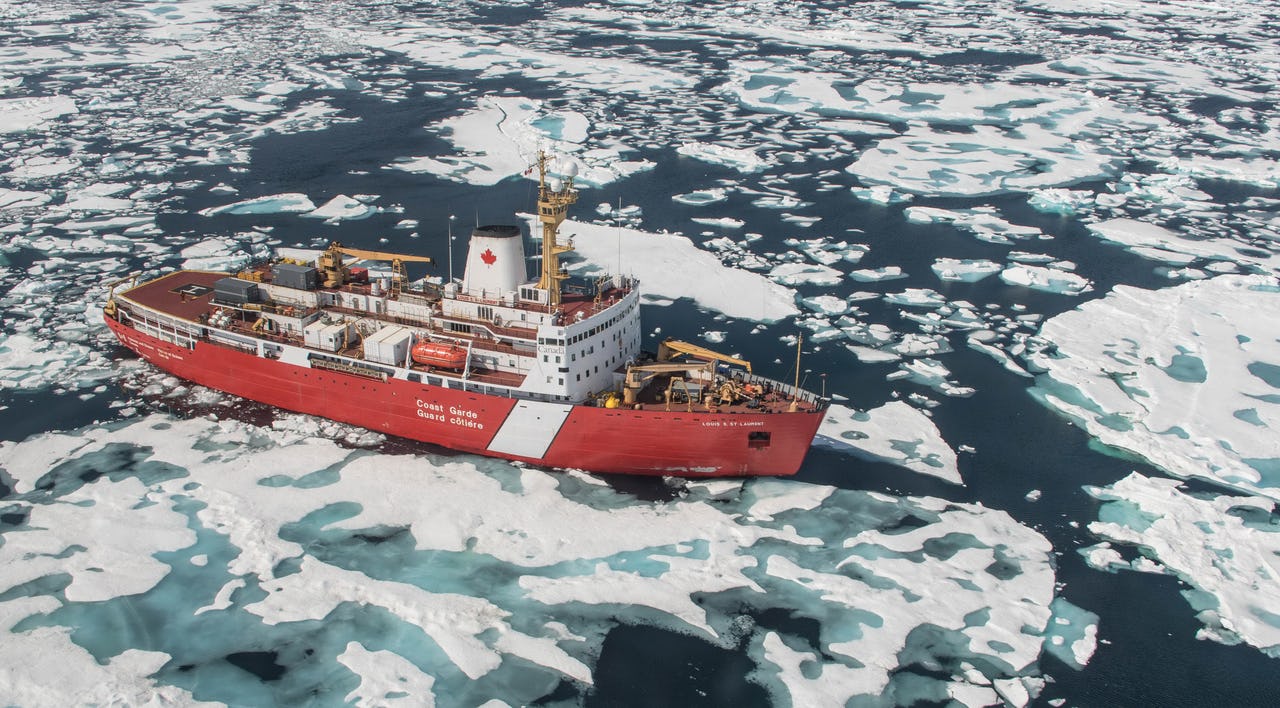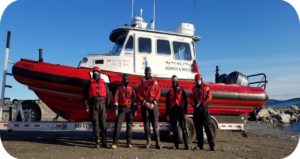Measures Taken by the Canadian Coast Guard to Respond to the Pandemic in the Canadian Arctic

Canadian Coast Guard icebreaker, CCGS Louis S. St-Laurent, in Hudson Bay, Nunavut, is part of the national fleet that supports the annual Arctic sealift to various coastal communities and carries out multi-disciplinary scientific expeditions. Coast Guard icebreakers are instrumental in ensuring the continuity of essential programs and services in the Arctic during the COVID-19 pandemic. Photo: Gary Morgan, Canadian Coast Guard
With the onset of the coronavirus (COVID-19) pandemic, the world has found itself in a global health emergency, which has caused a dramatic loss of human life worldwide and brought normal life around the world to a halt for the better part of a year. The Arctic Institute’s COVID-19 Series offers an interesting compilation of best practices, challenges and diverse approaches to the pandemic applied by various Arctic states, regions, and communities. We hope that this series will contribute to our understanding of how the region has coped with this unprecedented crisis as well as provide food for thought about possibilities and potential of development of regional cooperation.
The Arctic Institute COVID19 Series 2020-2021
- COVID-19 in the Arctic: The Arctic Institute’s Winter Series 2020-2021
- COVID-19 and Arctic Search and Rescue, our Duty to Act
- Vulnerable Communities: How has the COVID-19 Pandemic affected Indigenous People in the Russian Arctic?
- Brazilians in the Arctic: A Global Experience with Mental Health during the COVID-19 Pandemic
- COVID-19’s Impact on the Administration of Justice in Canada’s Arctic
- Isolation and Resilience of Arctic Oil Exploration during COVID-19: Business as usual or Structural Shift?
- COVID-19: How the Virus has frozen Arctic Research
- Rethinking Governance in Time of Pandemics in the Arctic
- Russia’s COVID Blinders: Arctic Policy Changes or Lack Thereof
- Geography of Economic Recovery Strategies in Nordic Countries
- Fly-in Fly-Out Workers in the Arctic: The Need for More Workforce Transparency in the Arctic
- Measures Taken by the Canadian Coast Guard to Respond to the Pandemic in the Canadian Arctic
- COVID-19 in the Arctic: Final Remarks
One of the priorities of the new Canadian Coast Guard stand-alone Arctic Region, established in 2018, is to advance reconciliation with its Inuit, First Nations and Métis partners. To implement this mandate Coast Guard is working with its partners to identify priorities, and take a distinctions based approach to better align and enhance program and service delivery in the north. Since the World Health Organization declared a global pandemic in March 2020, never has it been a greater priority or more important for Coast Guard to be collaborating so closely with its Indigenous partners.
Representation in Arctic Communities Proves Important during Pandemic
During the first wave of the pandemic, strict public health measures were implemented to avoid community transmission, and they proved to be effective with very few cases of COVID-19 in the Arctic. In this second upsurge, the region has been more adversely affected by the virus as case numbers have been increasing.
As part of its reconciliation strategy, Coast Guard has been building relationships with Inuit, First Nations and Métis organizations and governments. During the early days of COVID-19 and throughout the 2020 operational season when Coast Guard worked with its Indigenous partners to address challenges, these relationships enabled a larger presence in the communities that it serves.
Adjusting Course and Continuing on During COVID-19
In a regular Arctic operational season, the Canadian Coast Guard delivers essential programs and services from May to November such as icebreaking, marine navigation, search and rescue (SAR), and environmental response (ER). Coast Guard also conducts training and exercising with the Coast Guard Auxiliary and other domestic and international partners, and undertakes community engagement. COVID-19 public health emergency directives meant that the Coast Guard had to respond quickly and adjust its Fleet Operational Plan for the 2020 summer season as well as plan for other essential programs to ensure no loss of services to Arctic communities. Coast Guard Arctic Region immediately adjusted course and focused on a new plan for marine navigating and icebreaking and delivering essential SAR, ER and marine navigation services.

As the situation evolved, Coast Guard took clear measures to adapt to the pandemic and to reduce the risk of community spread, including physical distancing, self-isolation, mandatory personal protective equipment and daily health screening, strict cleaning and disinfecting measures aboard ships, crew changes in the south, cancellation of shore leave and the testing of all sea-going personnel for COVID-19.
Exceptions were granted by the territorial governments and public health officials for some travel into the Arctic with specific guidelines, but in other cases, alternate measures were taken such as the mandatory self-isolation.
At first, ship-based community engagement was not possible, but later, once appropriate measures were introduced, Coast Guard resumed in-person community engagements at the request of Inuit and other Indigenous partners.
Collaborating with Partners on Health and Safety
Since 2018 Coast Guard has conducted extensive engagements with its Indigenous partners across the Arctic. The coming together of Inuit, First Nations and Métis partners, territorial and provincial governments, public health officials, other federal government departments and industry to urgently discuss the impact of the COVID-19 restrictions, identify possible solutions, seek exceptions and manage expectations was instrumental in Coast Guard being able to effectively change course for its 2020 operational season.
The cooperation between industry partners was excellent, and lessons learned about operating in a COVID-19 environment were readily shared from the international shipping community and applied to the Canadian Arctic operational season.
2020 Operational Season Results, and Beyond
Despite everything, Coast Guard’s 2020 operational season was a success. Icebreakers successfully followed through on operational and program commitments in the Arctic including community re-supply and icebreaking, conducted hydrographic surveys, maintained navigational aids and supported science programs. Coast Guard remained on standby in the Arctic, ready to respond to any emergency with operational readiness, quick action and a reallocation of its resources.
All eight Coast Guard icebreakers that were deployed to the Arctic returned south after a safe and successful operational season. There were no cases of COVID-19 on any Coast Guard vessel, nor any major ER or SAR incidents, or community spread of the virus. Aids to Navigation were placed, opportunistic multibeam sonar mapping of the Arctic floor bed was undertaken to chart safe corridors, and scientific research was conducted aboard Coast Guard’s ships.
Despite the Government of Canada’s ongoing roll-out of the COVID-19 vaccine, Coast Guard anticipates that the pandemic will keep presenting operational challenges for program and service delivery in the Arctic. Challenges faced in 2020 have laid solid footing for the 2021 Arctic operational season – whatever it may bring!
Michelle Maloney is a Senior Program Officer with the Canadian Coast Guard’s Arctic Engagement and Liaison group, based out of Ottawa, Ontario. Outside of work Michelle is an avid outdoors person and enjoys backcountry hiking, cycling, paddling, and traveling to faraway places, as often as possible. One of her bucket list travel destinations is the Canadian Arctic.